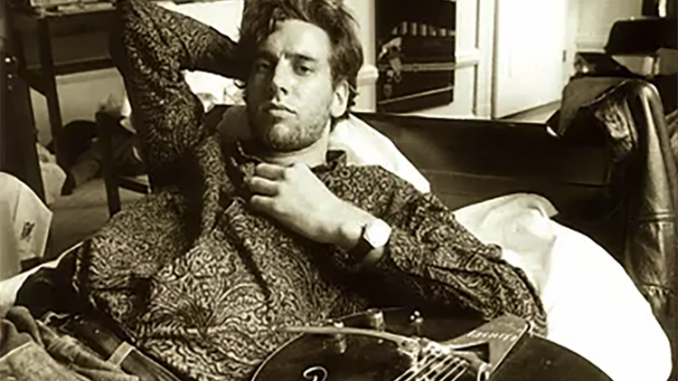
Jeff Jenkins on Love in Bright Landscapes, the Story of David McComb of The Triffids which is released on DVD on July 6.
Question: What do you like?
David McComb: Everything that everybody else doesn’t like.
When I wrote about the David McComb documentary Love in Bright Landscapes for Rhythms last year, I said it played like a great Triffids album, with direct pop moments that hit you right in the heart, as well as atmospheric scenes that allowed the story to gently wash over the viewer.
After a cinema run, now comes the deluxe DVD release, with several bonus tracks.
Most illuminating is writer/director Jonathan Alley’s Q&A with McComb’s brother Robert and his childhood friend Phil Kakulas, of The Blackeyed Susans.
“I felt that Australia had missed David as a character in our national culture,” Alley says, explaining why he wanted to make the movie. We lionise sporting figures, he believes, “whereas people of real cultural weight, who work independently, get ignored”.
Kakulas talks about the challenge of growing up in Perth, one of the world’s most isolated cities. “How do you take that isolation and do something artistic, do something creative with it?”
He says McComb turned that “weakness into a strength”. He admired how the singer “embraced the daggiest aspects”, highlighting the cover of The Triffids’ most acclaimed album, Born Sandy Devotional. “I laughed out loud when it showed Mandurah, which was the retirement capital of Perth in those days … nothing was off limits and he didn’t care if it was fashionable or hip.”
Alley calls McComb “one of the original punks”, recalling how The Triffids turned up to the Leederville Punk Festival wearing dressing gowns. “That’s your version of punk. There was no high-brow or low-brow with David – it could be daytime television or Russian poetry.”
The DVD revisits McComb’s stint as a TV reviewer for ABC’s Radio National, replaying his 1993 critique of NBC’s Today Show, which foreshadowed the breakfast TV that we enjoy/endure today. “No wonder so many Americans have substance-abuse problems and no wonder the country is in denial,” McComb rants. “The NBC Today Show is such a grotesque, stylised, heightened universe, it’s best experienced through the subtle derangement of insomnia.” (Though McComb admitted he found “exquisite beauty in this banality”.)
The Man Booker Prize-winning novelist DBC Pierre – who voices McComb’s poems and letters in the documentary – explains why he’s a Triffids fan in an extended interview on the DVD. “They don’t fall into the category of anything else that was happening in the ’80s. This, for me, is music of all time.”
He highlights the background of the band members – “affluent, well brought-up, well-educated kids who could have grown up to be doctors or lawyers … that is very interesting”.
Pierre contrasts the softness of The Triffids with the brutality of The Birthday Party. “What’s beautiful about The Triffids is these are songs you could play for a kid – if you took the lyrics out, these are little ditties.”
He likens the Triffids music to a hypodermic needle – “it gets under your skin”.
The former director of the Sydney Festival, Fergus Linehan, was surprised when he came to Australia from Dublin and discovered that the local music scene was dominated by Cold Chisel and INXS and no one mentioned The Triffids, the Bad Seeds and The Go-Betweens. “That optimistic, chipper view of Australian life is only one-half of the story,” he believes. “There is a kind of tremendous melancholy about Australia as well.”
Linehan discusses the “nostalgia” for the ’80s, “but the ’80s were awful – the ’80s were a hideous time to be around. There’s a lot of revisionism about what people were listening to in the ’80s; people were not listening to The Triffids.”
The DVD also captures The Triffids in full flight, with a remastered 1984 gig, The Night of The Triffids – Live at Paddington Town Hall, exclusive to the DVD release.
And Melbourne poet Sean M Whelan performs a spoken word piece, ‘How To Climb Inside A Song And Disappear Completely’, which describes McComb’s work. “Leonard Cohen built a tower of song,” Whelan states. “But you, you were always so much closer to the ground. Yours was more like a barn, or woolshed – a woolshed of song.”
Though Love in Bright Landscapes is a celebration of McComb’s work, it is also a tragic tale, as the artist died in 1999, aged 36, following a heart transplant and battles with alcohol and drugs. “To me, the great contradiction in the film,” Alley says, “is you have this really driven, determined person, so focused on succeeding, but I feel he got lost in so many ways.”
Alley quizzed Robert McComb and Phil Kakulas about what David would have thought of the film. “I think he’d come back with 20 or 30 points,” Kakulas laughs. “He’d like to make some changes and he’d itemise them.”
“I wish the film could have ended differently,” Kakulas adds, poignantly. “But was that trajectory [of McComb’s life] inevitable? Could we have intervened? Was there something I could have said or done? They were the questions I came out asking myself.”
Love in Bright Landscapes took Alley, a Melbourne writer and broadcaster, 13 years to complete. “I’ve heard that you don’t ever finish a documentary,” Robert McComb notes, “you only abandon it. At least Jonathan has abandoned this at the right time.”
Love in Bright Landscapes, the Story of David McComb of The Triffids is released on DVD on July 6 by Madman Entertainment.

